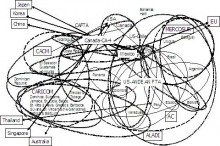What Determines the Strength of De Jure Regional Integration?

Baier and Bergstrand (2004) argued that in FTA formation, as it was dominated by social welfare considerations, economic and geographical factors prevailed on political and institutional characteristics. Their conclusion was supported by M´arquez-Ramos et al. (2011) who analysed the determinants of different stages in regional integration, including deeper forms than FTAs such as custom unions (CUs) or common markets (CMs). In each stage of integration considered, they found that socio-political and institutional factors were less important than economic and geographical characteristics. Only Endoh (2006) found that political determinants had a larger weight than economic characteristics in the conclusion of preferential trade agreements compared to FTAs and CUs. Concerning regional integration between Sub-Sahara African countries where economic determinants are a priori expected to matter less, Standaert and Rayp (2016) found that rent-seeking and shielding, proxied by the control of corruption, dominated on economic determinants.
Due to the lack of data, the literature until now has however only considered the qualitative difference in integration between the respective stages in the Balassa hierarchy of integration but ignored the substantial heterogeneity within each category, as reflected in indicators of the scope and strength of integration or of the authority of supranational organisations. For example, Hooghe et al. (2017) construct a measure of international authority in two dimensions (pooling and delegation) that shows considerable variation between organisations. The indicator or international authority we computed for regional organisations, based on the data of the Comparative Regional Organisations Project (Jetschke, 2011, see also https://lehrstuhlib.uni-goettingen.de/ crop/information/ ), has a standard deviation almost as large as its mean. This indicates that the Balassa hierarchy may be a weak predictor of the extent to which countries are willing to abandon sovereignty to the benefit of supra-national organisations. This indicates in addition that the determinants and their respective weights may differ between the formation and the strength of an organisation. The transfer of sovereignty to a common organisation can be assumed to depend on trust and common institutional norms between member countries. Therefore political and institutional characteristics may matter more for the institutional strength than for the formation of an organisation.
In this contribution, we analyse empirically what may explain the institutional strength of regional integration, i.e. the authority that countries are willing to transfer to regional organisations. Using the new indicator of international authority of regional organisations that we computed, we estimate a two-step Heckman model of which the first step models the probability that two countries join a regional organisation and the second step the institutional authority they give to this organisation. In this way, we verify to what extent political and economic determinants affect differently the formation and the institutional strength of an organisation. In contrast to the crosssectional analysis to which previous studies on the formation of organisations were constrained, by using the RIKS database of UNU-CRIS (https://riks.cris.unu.edu/), our data on country membership of regional organisations covers the whole post World War II period. The time varying information on the formation and membership of organisations is matched with the (time-varying) indicator of institutional strength derived from the CROP database, which is based on the information in the founding treaties of the organisations and major changes thereof. As explanatory variables, we include the economic, geographical, institutional and political country characteristics that are common in other studies in this field. Regarding the institutional strength of the organisation two countries join, our first estimation results point to a significant positive effect of democracy, governance quality, as measured by the world governance indicators, and a common official language. A common colonial past, indicated by a colonial link or common coloniser have a significant but negative effect on the strength of the organisational link between the countries. This stands in contrast to their effect on the likelihood of the formation of an organisation between two countries, which is significantly positive. The strength of organisational links between countries is also significantly negatively affected by the economic scale of the countries (measured by their average GDP) and the difference in economic size. From the insignificance of governance quality and colonial link on the likelihood of the formation of an organisation and the difference in marginal effects in the first and second step, we find that political and institutional determinants have a larger impact on the institutional strength than on the formation of an organisation.
This is a closed event. For further information, please contact Ruben Dewitte (RubenL.Dewitte@UGent.be) and Pascale Vantorre in cc (pvantorre@cris.unu.edu).
Upcoming Events
Similar Events
No events found.


